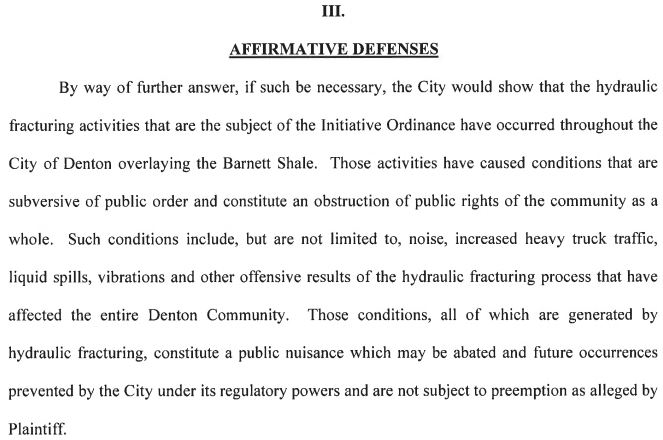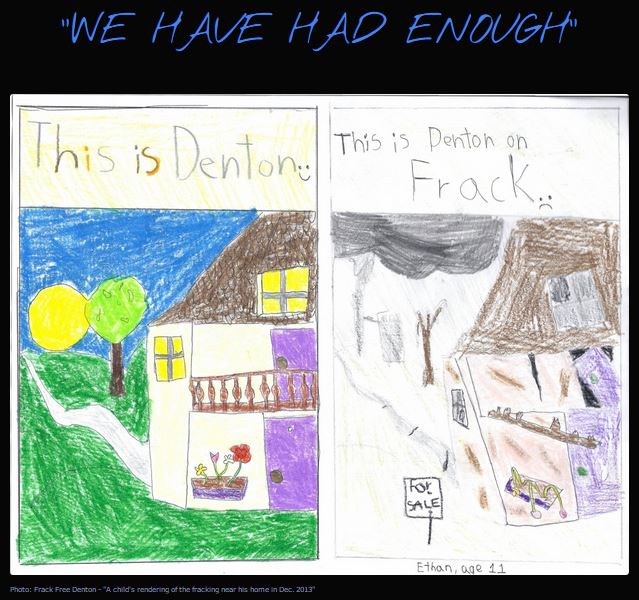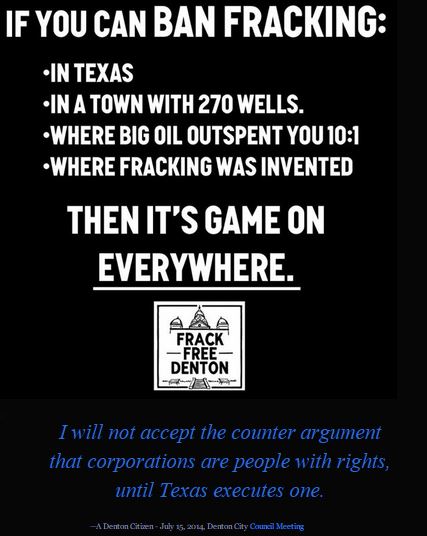How a ruby-red Texas town turned against fracking by Suzanne Goldenberg, December 2, 2014, The Guardian
The fracking ban that comes into effect on Tuesday in the heart of Texas might never have happened at all, if industry had not insisted on fracking beside a local hospital, a children’s playground, and the 100-year-old farmhouse that was Cathy McMullen’s retirement dream. That brought fracking a step too far. McMullen believes such overreach – typical under the Texas regulatory framework – helped turn a ruby-red Republican town against fracking.
Despite industry objections – and death threats for McMullen and other activists, Denton voted by 60% to ban fracking last month. … Over the last few years, oil companies have fracked wells in Denton churchyards and on school properties, in suburban developments, and on the campuses of two local universities.
There are a total of 280 oil wells inside Denton city limits, which will go on producing under the ban. Two of them are a few hundred feet from McMullen’s home. She and her husband, a former FBI agent, fled to the town in June 2009 to escape a well going in on the fence line of their former home on 11 acres in neighbouring Wise County. Wise County is the birthplace of fracking…. The couple had been in their new house a week when McMullen looked out on to an empty field off the main road, and saw a row of five posts with pink plastic flags fluttering in the breeze. “I knew they intended to put wells there,” she said. “My heart sank.” Her husband, Ron Watson, suggested they sell up and move on. McMullen was having none of it. “I told him: ‘If we run now, we’re going to be running forever. If we stay in Texas, we just decide to stay and fight it’.”
…
There were many evenings when McMullen found herself the sole voice against fracking at the meetings. She never felt industry or the council took her seriously. “They were dismissive. They were very paternal. They were: look, we know you kids don’t understand this, but we are doing this for your own good,” she said. “They were disrespectful.”
The town did eventually adopt new regulations in early 2013 imposing some restrictions on fracking. McMullen felt the new rules did not go far enough, and as it turned out, industry did not feel bound even by those relatively light restrictions. Soon after the ordinance came in, in the summer of 2013, oil drillers began to frack two wells near a new suburban development, the Meadows at Hickory Creek, which is full of young families. McMullen and Briggle were horrified – and so were local residents. “It was loud, constantly loud,” said Maile Bush, who has a young son and daughter, and whose home lies about 750ft from one of the well pads.
That Halloween, many parents in Hickory Creek stopped their kids from going trick or treating, because the air was so bad. Many mothers still don’t let their children play outdoors. Bush’s son, Kaden, six, began getting weekly nosebleeds. His asthma – which had been under control earlier – got much worse.
McMullen and others decided it was time to press for an outright ban on fracking. Not that anybody seriously believed it would work – certainly not the oil industry – but McMullen thought there was no choice. … McMullen, Briggle and others found a lawyer – who wishes to remain anonymous – and drafted a ballot initiative. The wording of the measure specifically banned fracking – not drilling – a tactic intended to show that opponents were not against all industry activity, McMullen said. … The oil industry bankrolled an expensive counter-campaign, recruiting a former mayor and university officials to speak up for fracking. They plastered the town with flyers reading “Denton moms oppose drilling ban” and warned that the ban would hurt city schools.
But McMullen had momentum. By election day, hundreds had volunteered for the campaign, going door to door, hosting barbecues, and organising a free concert in the town square. “The camaraderie was incredible,” McMullen said. [Emphasis added]
City answers fracking ban lawsuits by Peggy Heinkel-Wolfe, December 1, 2014, Denton Chronicle Record
The city of Denton has answered lawsuits from the state and from the oil and gas industry challenging its ban on hydraulic fracturing, calling the process a public nuisance and one that subverts public order. The city also asked for a change of venue in the state’s case against the ban. The citizen-driven initiative, which passed by a wide margin on Election Day, officially goes into effect today. In a prepared statement, Mayor Chris Watts said on Monday that the filings were consistent with the City Council’s direction to uphold the vote of the community.
Both the state and the oil and gas industry filed lawsuits the day after the election, challenging the ban on state constitutional grounds and seeking injunctions to stop enforcement.
The Texas General Land Office, through Commissioner Jerry Patterson, filed suit in Travis County. Patterson claimed a fiduciary responsibility to the state agency that oversees state-owned lands on behalf of Texas public schools, including the $1.2 billion deposited in the state’s Permanent School Fund last year, largely from oil and gas revenues. In the request for a change of venue, the city said it was improper to try the case in Travis County because the state provided no reason for the venue and was seeking relief solely in Denton County. The Texas Oil and Gas Association filed in Denton County.
The city took special exception to the claim by the Texas Oil and Gas Association’s lawsuit that the “entire field” of regulations by the Texas Railroad Commission and the Texas Commission on Environmental Quality pre-empted the city’s ban. The city asked Denton District Judge Jonathan Bailey to order the association to be specific with that claim, a requirement in Texas courts known as “fair notice.”
In the state’s lawsuit, the city took a similar exception, saying that the petition failed to specify how the city’s alleged actions conflicted with the state constitution or were “arbitrary, capricious and unreasonable.”
In both lawsuits, the city said to defend the ban, it would show, if necessary, that fracking “caused conditions subversive of public order and constitute an obstruction of public rights of a community as a whole.”
The defense included a list of public nuisances associated with fracking, including heavy truck traffic, spills, vibrations and other offensive practices.
The answers were filed by Terry Morgan, a Dallas-based attorney who has advised the city on its oil and gas development ordinance for several years, along with two other attorneys, James W. Morris Jr. of Dallas and Jose E. de la Fuente of Austin.
City spokeswoman Lindsey Baker said the city has sought additional counsel in answering the lawsuits, but the city hasn’t settled on whether to hire another or additional attorneys for the defense. “For the long term, that has not been determined,” Baker said.
Should the industry’s challenge prevail in court, the ruling would benefit all operators, according to Tom Phillips, a former chief justice of the Texas Supreme Court and an attorney with Baker Botts, which represents the association.
Currently, no operator is fracking in the Denton city limits. The ban does not affect operators working in the city’s extraterritorial jurisdiction.
Cathy McMullen, president of the Denton Drilling Advisory Group, issued a statement in response to the filings, hailing the city’s actions. “It speaks well of our city that Denton city government today acted to defend the fracking ban,” McMullen wrote. “Denton voters enthusiastically passed the ban by almost 20 points. It passed with the majority of Republicans, and with the majority of Democrats. We’re glad our city is listening.”
A motion for the Denton Drilling Advisory Group to join the city as an intervenor — helping to defend the ban — is expected as soon as this week. [Emphasis added]
Denton answers lawsuits by Peggy Heinkel-Wolfe, December 1, 2014, Denton Record Chronicle
Just back from the Denton County courthouse to get a copy of the city’s answer to the Texas Oil and Gas Association lawsuit against the city’s new ban on hydraulic fracturing. City staff tell me a copy of the answer to the General Land Office’s lawsuit will be in my in-box shortly.
You can see it’s fairly simple, just two pages to say that the “entire field” of regulations from the Texas Commission on Environmental Quality and the Texas Railroad Commission don’t meet the requirement of fair notice.
Further, the city offers the defense that the citizen’s initiative is not subject to preemption because of the public nuisance fracking brings. [Emphasis added]
From Denton’s Response:
By way of further answer, if such be necessary, the City would show that the hydraulic
fracturing activities that are the subject of the Initiative Ordinance have occurred throughout the City of Denton overlaying the Barnett Shale. Those activities have caused conditions that are subversive of public order and constitute an obstruction of public rights of the community as a whole. Such conditions include, but are not limited to, noise, increased heavy truck traffic, liquid spills, vibrations and other offensive results of the hydraulic fracturing process that have affected the entire Denton Community. Those conditions, all of which are generated by hydraulic fracturing, constitute a public nuisance which may be abated and future occurrences prevented by the City under its regulatory powers and are not subject to preemption as alleged by Plaintiff.
Attorneys to help Denton residents defend fracking ban by Max B. Baker, November 30, 2014, Star Telegram
Cathy McMullen, leader of the grassroots group that successfully pushed for the city ban on hydraulic fracturing, said the group plans to be an intervenor in lawsuits filed to challenge the ban passed by voters Nov. 4. She said the group will be helped by attorneys with various areas of expertise, something they plan to announce this week.
“It’s a group of high-powered attorneys familiar with these kind of cases,” McMullen said.
The Texas Oil and Gas Association and the state’s General Land Office filed lawsuits the day after the election to stop the city’s effort to prohibit the controversial drilling method.
The industry association filed its lawsuit in Denton County, saying the ordinance exceeds the limited power of home-rule cities and intrudes on the authority of several state agencies, particularly the Texas Railroad Commission, which regulates the oil and gas industry. [Why is industry suing for the regulator? How tight are they between the sheets in Texas]
The General Land Office’s lawsuit, filed in Travis County, seeks to protect money flowing into the Permanent School Fund from drilling. Like the Texas Oil and Gas Association, the land office argues that the ban is unconstitutional. The agency is seeking a permanent injunction.
Meanwhile, McMullen said her group plans to hang around the Capitol in Austin when the Legislature reconvenes after the first of the year. Several lawmakers, including state Rep. Phil King, R-Weatherford, say they are prepared to offer legislation banning the ban.
Hiring the attorneys frees up the group’s volunteers for “the politics of this,” she said.
[Refer also to:
Denton became the first Texas city to ban hydraulic fracturing Tuesday after a citizen-driven proposition cruised to a landslide victory at the polls.
FrackingCanada We Have Had Enough
Pennsylvania Supreme Court Says It’s Unconstitutional For Gas Companies To Frack Wherever They Want
“By any responsible account,” [Pennsylvanian Supreme Court] Chief Justice Castille wrote, “the exploitation of the Marcellus Shale Formation will produce a detrimental effect on the environment, on the people, their children, and the future generations, and potentially on the public purse, perhaps rivaling the environmental effects of coal extraction.” ]



